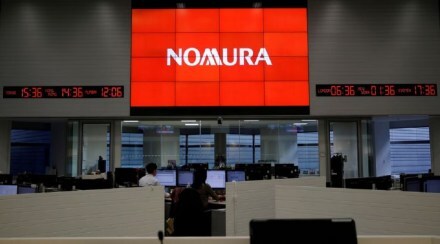The stock market has been on a rollercoaster ride this week. While some stocks managed to hold their ground, others came under pressure. Amidst this volatility, global brokerage firm Nomura has given a ‘Buy’ recommendation on select stocks.
Here’s a look at the top stocks the brokerage is betting on this week.
Nomura has Buy recommendation on these 4 stocks
Nomura on Axis Bank: Sees 21% upside from current levels
The brokerage in its report noted that Axis Bank has seen a 13% decline in the past six months, underperforming the Bank Nifty, which dropped only 3% in the same period. According to the brokerage this underperformance is primarily due to slow loan and deposit growth and a marginal weakness in asset quality compared to its peers.
However, the brokerage remains bullish on the Axis Bank stock, reiterating a ‘Buy’ rating with a target price of Rs 1,230, implying a 21% upside from current levels.
The brokerage house believes that if liquidity conditions improve, Axis Bank could accelerate its loan growth.
At its current levels, Axis Bank is trading at 1.6 times its one-year forward book value, with a widening valuation gap compared to major private lenders like ICICI Bank, HDFC Bank, and Kotak Mahindra Bank. The brokerage projects of a healthy profitability ahead, expecting the bank to deliver a Return on Assets (RoA) of 1.7% and a Return on Equity (RoE) of 14-15% over FY26-27. “We expect loan/deposit growth to remain soft at 9%/7% in FY25, gradually rising to 11-12% over FY26-27.”
Shriram Finance, Bajaj Finance are Nomura’s top NBFC picks
The brokerage firm has updated its outlook on non-banking financial companies (NBFCs), adding Shriram Finance (SHFL) and Bajaj Finance (BAF) to its list of top picks.
The brokerage firm sees strong potential in Shriram Finance, citing an expected 15-16% annual AUM growth and Return on Equity of 15 to 16%. The stock remains attractive, trading at just 9 times its projected FY27 earnings per share.
Bajaj Finance also remains on the brokerage ‘Buy’ list, backed by a 29% earnings CAGR and robust RoA/RoE of 4.1%/21% over FY26-27. Similarly, SBI Cards is expected to post an EPS CAGR of 45%, with a RoA of 4.5% and RoE of 21% over the same period.
Nomura on Samvardhan Motherson : Maintains ‘Buy’ but cuts target price
Nomura has reiterated its ‘Buy’ rating on Samvardhana Motherson International but reduced the target price to Rs 155 from the earlier Rs 209. Furthermore, the brokerage sees a 23% upside from current levels.
The brokerage has revised its valuation multiple to 18x earnings (from 22x), placing it in the middle of its historical trading range of 15-20x. The lower multiple reflects concerns over global tariff uncertainty and its impact on demand.
The company reported a consolidated revenue of Rs 27,700 crore in Q3FY25, marking an 8% YoY increase. However, this was 3 to 5% below Nomura’s and market expectations.
“Weak volume growth outlook and tariff uncertainty by the US remain growth headwinds for SAMIL. However, scale-up of acquisitions and ramp-up in the consumer electronics segment can keep driving strong earnings growth and diversify its mix further,” added the brokerage in its report.
Nomura on Fortis Healthcare: Target price at Rs 708
The brokerage firm has maintained its buy rating on Fortis Healthcare, with a target price of Rs 708 per share. As per the brokerage, the recent decision of the company to acquire Shrimann Hospital (unlisted) in the city of Jalandhar remains a key point to focus. “We think that the acquisition cost of INR19.5mn per bed for an operating hospital compares well with the project cost of greenfield projects,” added the brokerage in its report.
“We believe the acquisition is likely to be earnings-dilutive in the first year of operations. It is likely to be earnings-accretive in 2-3 years, in our assessment. We expect the acquisition to be value-accretive. With the acquisition value at
just ~1% of the company’s current market cap, we do not expect the value accretion to be material. The key risk is that the business is likely dependent on incumbent doctors. Attrition of key doctors can have an adverse impact on revenues and profitability, in our view,” noted the firm in its report.
